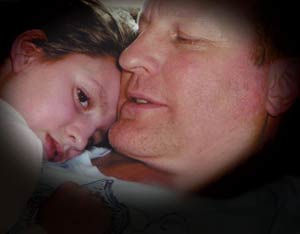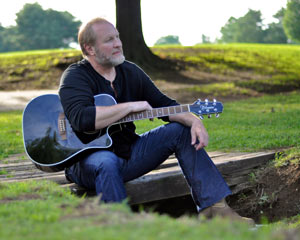 Country music star Collin Raye cuddles with his granddaughter Haley, who died from an undiagnosed neurological disorder at age 10 last year. (Photo submitted courtesy Collin Raye)When an undiagnosed neurological disorder claimed the life of his 10-year-old granddaughter last year, country singer Collin Raye thought he would be “useless.”
Country music star Collin Raye cuddles with his granddaughter Haley, who died from an undiagnosed neurological disorder at age 10 last year. (Photo submitted courtesy Collin Raye)When an undiagnosed neurological disorder claimed the life of his 10-year-old granddaughter last year, country singer Collin Raye thought he would be “useless.”
“Losing that baby, I just was so devastated I thought it would be crippling, but God gave me what I needed to wake back up, so to speak, and said, ‘No, no, no – I’m not done with you yet.’…” Raye, 51, told your Catholic Herald in a phone interview Oct. 28. “So, I was to take what I had learned from that loss and try to turn it into a positive.”
And he has with the release of his latest CD, “Through It All, His Love Remains,” featuring inspirational songs and two new singles, “Undefeated,” which he wrote with Haley’s mother, his 28-year-old daughter, Britanny, and “I Get What I Need.”
The CD, which he recorded with a rosary and picture of Haley lying on the lyric sheets, is dedicated to Haley.
But Haley didn’t know her grandpa for the CDs he released or the 10 nominations for Male Vocalist of the Year, 16 number one hits or 24 Top Ten songs. She didn’t know him for his songs, “Love, Me,” “That’s My Story” or “Little Rock.”
She knew him as her “Poppy.”
And Raye described Haley as a “very anointed child.” Before they knew she had a neurological disorder, Raye said there was something holy about her. Haley learned from Raye that the man on a crucifix was Jesus, in her words, “Ju Ju.”
“From then on, every time I’d be holding her, if she saw a crucifix, she’d go, ‘Ju Ju,’ and she’d reach for it, and I would walk her over there to it, and she would kiss Jesus on the crucifix – and no one taught her to do that,” Raye said. “I never showed her that she should kiss the crucifix or anything.” Country music star Collin Raye recently released a CD “Through It All, His Love Remains,’ with inspirational songs and two new singles. (Submitted photo by Jonathan Fowler)
Country music star Collin Raye recently released a CD “Through It All, His Love Remains,’ with inspirational songs and two new singles. (Submitted photo by Jonathan Fowler)
Haley would also say “Ju Ju” whenever they passed their church, Our Lady of the Lake in Rockwall, Texas, or any Christian church – even those whose buildings Raye said looked more like business offices or meeting halls. “We’d pass and she’d go, ‘Ju Ju. Ju Ju,’ and we’d be like, ‘Wow, I mean, how did she know that was a church?’”
But Raye will never forget the time he took Haley to visit her grandma’s house. Haley called out for her, but Raye told her she wasn’t home.
“I said, ‘No, mema went to church,’ and she looked right at me and just, she nodded her head like ‘Oh, Ju Ju,’” Raye said. “She was saying, ‘Oh, I get it, she went to see Ju Ju,’ and that’s just the kind of baby she was. I mean, she was just such a beautiful spirit.”
Raye is national spokesman for Life and Hope NetworkShortly after Haley died, Raye was contacted by the Terri Schiavo Life and Hope Network, formerly the Terri Schindler Shiavo Foundation that was created in 2001 to fight for the life of the Florida woman who had sustained brain damage and required a feeding tube for food and hydration; despite the struggle, Schiavo died in March 2005, 13 days after her husband successfully fought for the right to remove her feeding tube against her family’s will. Raye recently joined the network as its national spokesman, because of a similar experience he’d been through with his ex-wife, Connie, in 1985 – though the circumstances that made her sick were different, and she was comatose while Schiavo was awake. “Connie was flat-out comatose for nine weeks and I was told that I had the option of doing the things that Michael Schiavo wound up doing, which I would have scoffed at,” said Raye, explaining that Connie has lived a normal life since she awoke and went through a long rehabilitation. “So, the moral of the story is no one – no doctor and certainly no spouse or soon-to-be ex-spouse – can sit there and determine what someone’s quality of life is going to be if you just give them time and give God time, which is one of my big arguments with that whole thing.” |
But by ages 4, 5 and 6 the disorder with which Haley was born began to steal abilities like talking and swallowing.
“She couldn’t speak; she couldn’t communicate in any way,” Raye said. “She couldn’t control her hands to make a gesture, to scratch an itch. She couldn’t swallow – she was totally tube fed. … She could not turn herself over. She could not lift her head up. She really was totally 100 percent dependent on what we did for her,” Raye said of himself and Britanny.
The last happiness Raye saw in Haley was at about age 4, when she could play and wasn’t aware that anything was wrong.
“Then after 5, 6 – then you could tell she was starting to get really scared and realize things were leaving her and she couldn’t do things, and couldn’t speak and couldn’t tell us about it,” said Raye, who lives in Rockwall with Britanny and Haley’s 7-year-old sister, Mattie.
Raye’s faith wasn’t shaken, but during the struggles Haley encountered every day, he doubted God’s plan.
“I doubted what his motives were,” he said. “I actually got kind of angry many times where I’d be like, ‘Why are you not doing something? I mean, you don’t have to heal her all the way, but can you at least make it to where she doesn’t have to get pneumonia once a month?… Could you give her her ability to swallow back so she doesn’t choke every five minutes?”
But with the pleading came no improvement.
“That was brutal and tested my relationship with him, I guess I should say, more than tested my faith, but because I was Catholic I knew about suffering and I understood the value of divine suffering…” said Raye, who appreciates the truth he found in Catholicism when he converted from his Baptist roots at age 23. He threw out the misconceptions he was fed about Catholics while growing up in the Bible Belt, and from portrayals in movies like “Going My Way” and “The Bells of St. Mary’s.”
While in Portland, Ore., where he was performing with his band for five years, his curiosity spurred him to ask to attend Mass with a Catholic couple he met.
“They were thrilled to do that and from the moment I went in the church, I felt this overwhelming heavy peace – good heaviness – like there was something in the room besides just us and I had never experienced that before in the Baptist church that I had grown up in, or any other churches that I had ever attended, and so I knew I wanted to learn more and felt like I already came home,” said Raye.
A year later, he became Catholic.
“I did go out searching and so I can sit there and tell you from my experience this is the true church of God, and this is the church that Jesus Christ instituted himself, personally…” he said. “There’s no need to change from that. It’s the only church that has all the sacraments, so I mean, why would you want anything else?”
Raye appreciates the faith he found with support from his godparents in Oregon, and the way it has sustained him.
“I did understand that, yes, God can heal, and he can if he wants to and he will if he wants to, but if he has other plans, you can wear your knees out praying and he’s not going to answer it that way,” he said.
That understanding has also helped his family cope with unanswered prayers for Haley.
“There’s evil in the world, there’s sickness in the world, there’s death in the world, and, by the luck of the draw, sometimes, someone in your family is the target,” said Raye, who also has a 25-year-old son, Jacob.
Even in her short 10 years of life, Haley blessed everyone “immeasurably by her presence,” Raye said.
“I often think that maybe God allowed her to have this condition, because she was just too good to be in this world. I mean, you’ve got to be kind of tough to last here, and I just don’t think she was,” said Raye, noting that her sister is a go-getter with an edge and an attitude needed to survive. “I think her spirit was pretty perfect already and she didn’t need to be here for very long, and she did her job … and then he took her home.”
Raye said he feels the same is true with the many children he’s met since Haley’s death, including a few with similar conditions.
“You just feel this overwhelming innocence and goodness and holiness about them because of their condition, and you just think, ‘Well, they’re not meant long for this world,’ and so we need to soak them up and enjoy them in all that we can and never overlook their presence,” he said, “because I truly believe special kids like that are special little things that are given to us to bless us, to fix us, to get us on the right path and that’s exactly what she did with me.”
